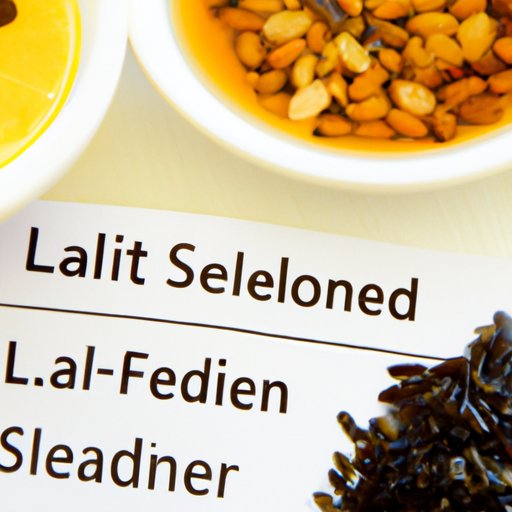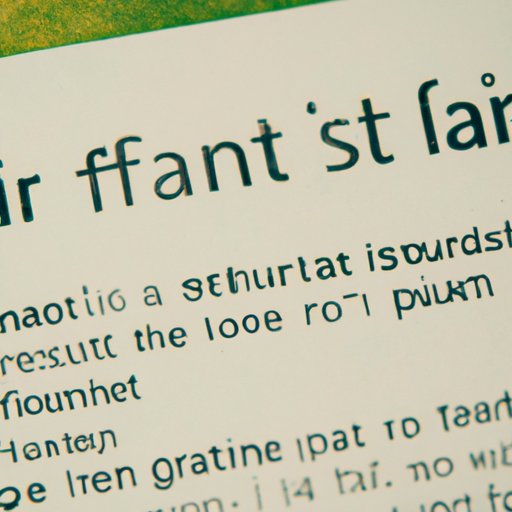Introduction
Hypothyroidism is a condition characterized by an underactive thyroid gland. This means that the thyroid does not produce enough of the hormones thyroxine (T4) and triiodothyronine (T3). Common symptoms of hypothyroidism are fatigue, weight gain, constipation, dry skin, muscle cramps, and depression. While there is no cure for hypothyroidism, making certain dietary changes may help to alleviate some of the symptoms.

Identify Foods Rich in Selenium and Iodine
Selenium and iodine are two minerals that are essential for the production of thyroid hormones. Eating foods that are rich in these minerals can help to improve thyroid health.
Food Sources of Selenium
Foods that are particularly high in selenium include Brazil nuts, sunflower seeds, tuna, shrimp, cod, turkey, eggs, and mushrooms. According to a study published in The American Journal of Clinical Nutrition, “selenium status is an important factor in maintaining normal thyroid hormone metabolism.”1
Food Sources of Iodine
Iodine is found in abundance in seafood and seaweed. Other sources of iodine include dairy products, eggs, and iodized salt. For people with hypothyroidism, it is recommended to consume 150 micrograms of iodine per day.2
Avoid Gluten-Containing Foods
Gluten is a protein found in wheat, rye, and barley. Research has shown that individuals with hypothyroidism have an increased risk of developing gluten sensitivity or celiac disease, an autoimmune disorder caused by consuming gluten.3 As such, it is best to avoid gluten-containing foods when trying to treat hypothyroidism.
Reasons to Avoid Gluten
In addition to the risk of developing celiac disease, avoiding gluten may also help to reduce inflammation in the body. Inflammation can interfere with the production of thyroid hormones, so reducing inflammation is key for treating hypothyroidism.4 Additionally, gluten can interfere with the absorption of other nutrients, such as selenium and iodine, which are necessary for healthy thyroid function.
Foods to Avoid
In order to reduce the risk of developing gluten sensitivity or celiac disease, it is important to avoid all foods containing gluten. This includes wheat, rye, barley, as well as any products made with these grains. It is also important to look out for hidden sources of gluten in processed foods and condiments.
Increase Intake of Iron-Rich Foods
Iron is an important mineral that helps to transport oxygen throughout the body. Low levels of iron can lead to anemia, which can exacerbate the symptoms of hypothyroidism. Increasing iron intake is therefore an important part of treating hypothyroidism.
Benefits of Increasing Iron Intake
Increasing iron intake can help to improve energy levels and reduce fatigue. It can also help to maintain healthy red blood cell production and prevent anemia. In addition, adequate iron intake is necessary for the conversion of T4 to T3, which is the active form of thyroid hormone.5
Foods High in Iron
Foods that are particularly high in iron include beef, chicken, spinach, lentils, cashews, tofu, quinoa, and dark chocolate. Vitamin C can also help to increase iron absorption, so it is important to include foods high in vitamin C, such as oranges, kiwi, bell peppers, and broccoli, in the diet.
Consume Zinc-Rich Foods
Zinc is a mineral that is important for the production of thyroid hormones. It is also needed for the conversion of T4 to T3, so adequate zinc intake is essential for treating hypothyroidism.
Benefits of Zinc
Zinc helps to reduce inflammation in the body, which can interfere with the production of thyroid hormones. Additionally, zinc helps to improve immune system function, which can be weakened in individuals with hypothyroidism.6
Foods High in Zinc
Foods that are particularly high in zinc include oysters, beef, crab, pumpkin seeds, yogurt, chickpeas, and cashews. It is important to note that zinc is better absorbed from animal sources than plant sources, so those with hypothyroidism should focus on incorporating more animal-based sources into their diets.
Eat Vegetables High in Vitamin A
Vitamin A is an important vitamin that helps to regulate the production of thyroid hormones. It is also important for the maintenance of healthy skin and eyes, both of which can be affected by hypothyroidism.
Benefits of Vitamin A
Vitamin A helps to reduce inflammation in the body, which can interfere with the production of thyroid hormones. It also helps to support healthy skin, hair, and nails, which can be negatively impacted by hypothyroidism.7
Foods High in Vitamin A
Foods that are particularly high in vitamin A include sweet potatoes, carrots, kale, spinach, butternut squash, cantaloupe, and apricots. It is important to note that it is best to get vitamin A from food sources, rather than supplements, as excessive amounts of vitamin A can be toxic.
Focus on Eating Anti-Inflammatory Foods
Inflammation can interfere with the production of thyroid hormones, so eating anti-inflammatory foods can help to reduce inflammation and improve thyroid function.
Benefits of Eating Anti-Inflammatory Foods
Eating anti-inflammatory foods can help to reduce inflammation in the body. This can help to improve overall health and reduce the symptoms of hypothyroidism. Additionally, anti-inflammatory foods can help to improve digestion and boost the immune system, which can be weakened in individuals with hypothyroidism.8
Foods to Incorporate into Diet
Foods that are particularly high in anti-inflammatory properties include fatty fish, such as salmon and mackerel, as well as turmeric, ginger, garlic, walnuts, berries, leafy greens, and olive oil. Additionally, it is important to limit or eliminate processed foods, sugar, and alcohol, as these can increase inflammation in the body.
Conclusion
Making changes to your diet can help to improve thyroid health. Eating foods that are high in selenium, iodine, iron, zinc, and vitamin A can help to increase the production of thyroid hormones. Additionally, avoiding gluten-containing foods, eating anti-inflammatory foods, and increasing iron intake can help to reduce inflammation and improve overall health. It is important to remember that everyone is different and it is best to consult with a doctor before making any significant dietary changes.
1 https://academic.oup.com/ajcn/article/87/2/372/4633504
2 https://www.ncbi.nlm.nih.gov/pmc/articles/PMC3632337/
3 https://www.ncbi.nlm.nih.gov/pubmed/22513901
4 https://www.ncbi.nlm.nih.gov/pmc/articles/PMC5300470/
5 https://www.ncbi.nlm.nih.gov/pmc/articles/PMC4909650/
6 https://www.ncbi.nlm.nih.gov/pmc/articles/PMC4387191/
7 https://www.ncbi.nlm.nih.gov/pmc/articles/PMC4277626/
8 https://www.ncbi.nlm.nih.
(Note: Is this article not meeting your expectations? Do you have knowledge or insights to share? Unlock new opportunities and expand your reach by joining our authors team. Click Registration to join us and share your expertise with our readers.)
